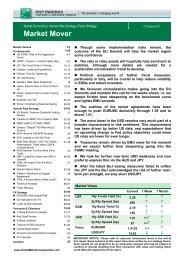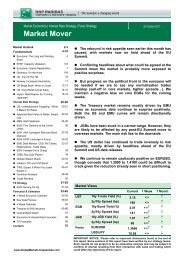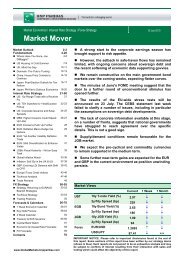MARKET MOVER - BNP PARIBAS - Investment Services India
MARKET MOVER - BNP PARIBAS - Investment Services India
MARKET MOVER - BNP PARIBAS - Investment Services India
Create successful ePaper yourself
Turn your PDF publications into a flip-book with our unique Google optimized e-Paper software.
ECB Upcoming Tenders: How Much?<br />
• EUR 225bn is expiring next week and there<br />
is good reason to think that liquidity will drop<br />
from current levels.<br />
• However, the sources of demand at tenders<br />
that expire next week point to significant roll,<br />
especially on the 3mth the ECB will conduct.<br />
• STRATEGY: Enter ER1-ER5 steepening<br />
position.<br />
Chart 1: Large Expiry Ahead<br />
1y MRO<br />
6m<br />
3m<br />
35.67<br />
1m<br />
19.08<br />
131.93 23.17<br />
153.77<br />
37.90<br />
96.94<br />
A very large expiry<br />
EUR 225bn is maturing next week: EUR 75.2bn from<br />
the second 1y tender the ECB carried out last year,<br />
EUR 17.9bn from the 6mth tender conducted in<br />
March and EUR 131.9bn from the 3mth tender<br />
conducted at the end of June. It is worth noting that<br />
the 3mth tender was conducted at the end of June<br />
and allowed banks to roll a significant part of the<br />
amount expiring from the first 1y tender<br />
(EUR442.2bn). The total amount expiring is very<br />
large and the current level of liquidity (EUR 591bn<br />
provided through the MRO and LTROs) is exposed<br />
to a decent decrease. However, looking at the source<br />
of demand at old tenders that expire next week, it<br />
seems that a large amount will be rolled.<br />
What can be expected for demand?<br />
A large part of the answer lies in the source of<br />
demand at the tenders that expire next week. The<br />
EUR 75.2bn 1y tender conducted in September 2009<br />
did not attract arbitrage as the 12mth eonia at that<br />
time was 0.69%, well below the refi rate. Demand<br />
therefore came largely from banks with little access<br />
to the market for long-term liquidity. It is reasonable<br />
to think that at least EUR 50bn will be rolled of the<br />
EUR 75.2bn expiring. When it comes to the EUR<br />
17.9bn from the 6mth tender (conducted at the start<br />
of April), it is interesting to note that liquidity provided<br />
in April 2010 with LTROs by the Bank of Greece to<br />
banks based in Greece increased by EUR 18bn. It is<br />
crystal clear that the EUR 17.9bn is in Greece and<br />
there is a good chance of seeing Greek banks rolling<br />
almost all the amount expiring. Finally, the bulk of<br />
next week’s expiry (EUR 131.9bn) comes from the<br />
3mth tender the ECB conducted on 1 July, the day of<br />
the expiry of the famous EUR 442.2bn tender. At that<br />
time, liquidity fell sharply as arbitrage disappeared,<br />
and demand for the 3mth came when the 3mth<br />
Euribor was at 0.78% and the 3mth eonia at 0.47%.<br />
Once again, it is worth noting that despite the fall in<br />
liquidity, the level of liquidity provided by the Bank of<br />
Greece in July thanks to the LTRO was unchanged<br />
17.88<br />
Maturity (days)<br />
75.24<br />
-20 0 20 40 60 80 100 120<br />
Source: <strong>BNP</strong> Paribas<br />
from June. This means that Greek banks rolled the<br />
expiry of the 1y with the 3mth. LTROs in Ireland fell<br />
almost EUR 20bn in July from June after increasing<br />
by EUR 40bn in June 2009, suggesting that demand<br />
from Irish banks at the 3mth tender in July was a<br />
floor. Given the level of the 3mth Euribor and the<br />
3mth eonia starting on 30 September, respectively<br />
0.90% and 0.54%, it makes sense to see relatively<br />
firm demand as the cost of ECB liquidity is relatively<br />
cheaper than it was three months ago. Against this<br />
backdrop, we see a very large roll of the 3mth expiry,<br />
well above EUR 100bn. As a result, we expect total<br />
demand at next week’s tenders of around EUR<br />
190bn. Two ECB tenders will offer banks the<br />
opportunity to be allotted. The ECB will conduct a<br />
fine-tuning, short-term 6day tender to allow banks to<br />
find liquidity until the next MRO. Given the evolution<br />
of demand at the MRO over many weeks, it appears<br />
that demand for short-term liquidity is roughly stable<br />
in the EUR 150-155bn area. Needs for short-term<br />
liquidity are unlikely to increase next week and we<br />
therefore expect the 6day tender will attract only<br />
moderate demand. Demand at the 3mth will<br />
therefore be very strong.<br />
As a result, with no change in demand at the MRO,<br />
we expect demand for next week’s 3mth tender could<br />
be in the EUR 165bn area and demand at the 6day<br />
close to EUR 25bn. This would lead to a EUR 35bn<br />
drop in liquidity. Given the current level of excess<br />
liquidity, just below EUR 100bn, a drop of EUR 35bn<br />
should not lead to significant upward pressures on<br />
short-term rates. Moreover, the extension of nonstandard<br />
procedures for open market operations<br />
means that there is no rush for very short-term<br />
liquidity. Eonia should remain close to current lows.<br />
This may favour limited resteepening pressures<br />
beyond the 3mth area.<br />
Strategy: Enter ER1-ER5 steepening position.<br />
Patrick Jacq 23 September 2010<br />
Market Mover, Non-Objective Research Section<br />
26<br />
www.GlobalMarkets.bnpparibas.com
















